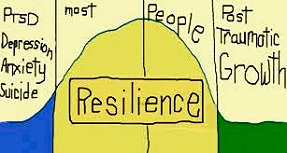 | ||||

The Silent Casualties Among Us
By Corpsman Ronald C. Mosbaugh
2/1 Hotel Company 1966-1967
HMCM USNR RET.
Email: rmosbaugh@outlook.com
In August of 1966, my life changed. It went from Heaven to Hell overnight. At the age of 19, I was transported to Vietnam where I witnessed countless Marines being wounded and killed. My happy world was shattered and forever changed. To live with fear daily and to have no hope for the future was a tremendously traumatic experience.
The emotions I experienced, while in Vietnam, were overwhelming. Every day I treated wounded marines and watched many die in my arms. I tagged and bagged more marines then I care to talk about, received two Purple Hearts in the process. Ever since that time, I have dealt with flashbacks and nightmares where I confront the ghosts of wounded, dying, and dead warriors.
For me, it has been a difficult journey since returning from Vietnam. PTSD has controlled my life, and I have learned that time is a misnomer when one is diagnosed with PTSD. I can close my eyes and quickly return to the front lines of war. I can see, hear, and smell battles as they happened. When this occurs, it is as if the traumatic experiences are happening in the present—in real time and not in the past. The feelings I have are incredibly intense. Sometimes the harder you try to forget, the more intrusive the demons become.
It is estimated that one million Vietnam veterans developed some level of PTSD after serving in a combat zone. In addition, 303,704 were wounded in action (WIA) and 58,200 were killed in action. (KIA) It was a very costly war on many levels, and I often ask myself, was it worth it?
When I returned from Vietnam, I was sent to Camp Pendleton Marine Base to be discharged from the military. There was no processing out procedure. We just were told to go home and forget the war. They told us not to wear our uniforms. We were supposed to leave and just forget what happened. We were supposed to get on with our lives and act like nothing had changed. They wanted us to believe that once we returned from combat, our lives would return to being normal and stable. We were expected to adjust quickly to the lives we had left. They believed time would eventually mend all wounds. However, it didn’t happen that way. Time actually made it worse for many returning soldiers. These soldiers spent years suffering and feeling different. Many were psychologically traumatized daily—and often they did not understand why.
The percentage of Vietnam veterans who suffer from PTSD is extremely high, but when we returned home, there was little to no mental health follow-up. Many warriors kept their suffering a secret because they believed to be treated for a mental health condition was a sign of weakness. PTSD finally began to be discussed as an issue in the late 1980s, and while many soldiers are being treated today, many still suffer in silence. They need to know PTSD does not go away with time. It keeps on affecting the mind, heart, and soul as long as you live.
Post-traumatic stress disorder is the ultimate hidden enemy. It attacks soldiers with fear, frustration, anxiety, and depression. Never knowing when the ambush will occur, the victim is on constant alert for the next tormenting event.
The trauma we incurred on the battlefield was horrifically brutal. It was something you cannot forget, and we are forced to relive our emotional injuries over and over. Our minds constantly resurrect those terrible memories and painful feelings. These reminders from our past cannot be erased—no matter how hard we try.
PTSD has many characteristics and manifestations. Symptoms can appear quickly and without warning. These symptoms can range from small and subtle to disabling and overwhelming. I often feel compassion for these brothers because I realize many of them are still living in Vietnam.
There remain many “silent casualties among us” in our medical clinics and hospitals. Thousands more walk our streets and daily face their demons alone. I want these brothers to know that while PTSD is a serious problem, there is also Post-Traumatic Growth (PTG). PTG involves taking something negative and turning it into something positive. With PTSD, you have to deal with it and try to turn it into something positive.
I read a story on the internet not long ago that said research is just now untangling a seemingly intricate dance between post-traumatic stress and post-traumatic growth. The story described a shattered vase. “Imagine that one day you accidentally knock a treasured vase off its perch. It smashes into tiny pieces. What do you do? Do you try to put the vase back together as it was? Or do you pick up the beautiful colored pieces and use them to make something new - such as a colorful mosaic? When adversity strikes, people often feel that at least some part of them -- be it their views of the war, their sense of themselves, their relationships -- has been smashed.” (author unknown)
So many times, warriors try to put their lives back together exactly as they were. That is impossible became they have been changed. They are different, and their lives are different. Like the vase, they have been fractured and broken. If they can learn to accept the breakage and build themselves anew, they may become more resilient and more open to new ways of living.
The next time you see a veteran, would you please thank him/her for their service.
HMCM Ronald C. Mosbaugh
Master Chief Corpsman (E-9)
31 years USNR retired
